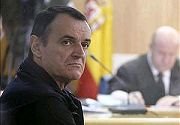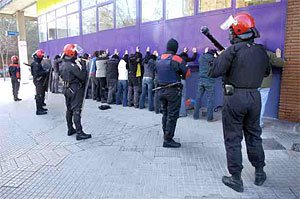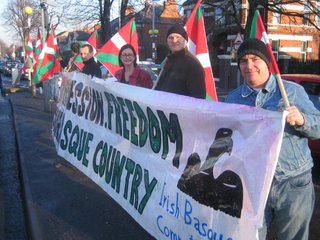BATASUNA ON MADRID ATTACK
The leader of the banned political party Batasuna, Arnaldo Otegi, has assured that the attack on saturday in the Madrilenian airport of Barajas does not imply the rupture of the peace process. In fact, he has appealed to "serenity and responsibility". "The process is not broken", has insisted calmly, in fact, now it is more necessary that never to maintain it alife "because is what the Basque and Spanish majorities want" it is time to reinforce and estabilise it.
Just after that, Arnaldo Otegi remenbered that in the last few moths Batasuna has many times denounced that the process to overcome the conflict had structural problems. Also mentioned that in the past nine months no party's board has been formed, that there is no agreement and also, has not neared the prisoners and Iñaki de Juana Chaos, in hunger strike, is on the verge of dying "tied to the bed of a hospital". Has criticized that representatives of the socialist Executive "has been boasted to have done less than the others" in previous truces. All of these, Batasuna believes, clearly shows how fragil the process really was. Otegi has blame the spanish government of letting the cease fire reach to an end underlining that a process can not be built in such a situation.
Never the less the situation is not "Broken" believes the left pro-independence party, "the process is necessary and we must go on" underlining its compromise to go to the end.
Strong bases are needed, "Sadly, if there was anything agreed it has not been fulfilled and if there was none nothing has been build" said Otegi. "Todays attack must not bring us back to the situation before the 24th March" day of the cease-fire was called.
To re-start the process and go on with the talks some "basic conditions" must be ensured. All the differents sensbilities must take part in a process to build a new framework in the absence of violence based on respect. "All the parties involbed must take part on this compromise towards resolution, Batasuna will forward new ideas to make that dialogue posible"
In his intervention, the spokesman of Batasuna has expressed his "solidarity with the wounded" and their hope "so that it appears the body of the missing person"
ATTACK
Car bomb explodes at Madrid's Barajas airport
12/30/2006
Two police, who were looking for the suspect vehicle, and two more people were slightly injured in the blast.
A car bomb exploded in a parking lot at Madrid's Barajas airport on Saturday after an anonymous telephone warning, Spanish police said.
The blast came about 9:30 a.m. (0830GMT) at the airport's new Terminal Four, said Javier Ayuso, a spokesman for the emergency rescue services of the Madrid city government. A warning had been telephoned to motorway rescue services DYA in the Basque region of Gipuzkoa.
Barajas Airport's Terminal Four was evacuated after the warning, state radio reported. Two police officers who were looking for the suspect vehicle, a taxi driver and a fourth person were slightly injured and taken to hospital.
A huge column of thick, gray smoke rose from the blast site more than an hour after the explosion and the building housing the parking lot appeared to be on fire. The airport is not operative, said Iberia, the Spanish flagship carrier that runs most flights out of this terminal.
Three phone calls
According to the Basque radio station Euskadi Irratia the anonymous caller phoned three times. He first called the DYA at about 8:00 in the morning and warned of a bomb at Madrid's Barajas airport's new Terminal Four which was due to explode at 9:00.
Thirty minutes later, there was a second phone call, this time to the emergency coordination centre SOS Deiak, asking to take the warning seriously and claiming to speak in the name of the armed Basque group ETA. There was a third phone call to the Madrid firefighters.
REACTION TO THE ATTACK
Spanish Govt. suspends "all initiatives for dialogue with ETA"
12/30/2006
Spanish President José Luis Rodriguez Zapatero said "today's attack is incompatible with a permanent cease-fire.''
Spanish Prime Minister Jose Luis Rodriguez Zapatero on Saturday suspended dialogue with the armed Basque group ETA after a bomb wrecked a car park at Madrid's international airport being the first attack after nine months of unilateral ceasefire.
"As the conditions that we laid down have not come about, I have ordered the suspension of all initiatives to develop a dialogue," said Zapatero at Moncloa Palace in Madrid's outskirts.
Zapatero considers "that today's attack is incompatible with a permanent cease-fire'' and as a consequence he has decided to suspend all initiatives for dialogue with ETA."
NEW YEAR'S EVE'S MESSAGE
"I won't consider peace process or dialogue broken"- Basque PM
12/31/2006
The Basque Autonomus Region's (Three of the seven Basque provinces) president said after the attack in Madrid's airport "the right of the Basques to decide their future is not neither in the hands of ETA, nor of the Spanish Govt., but in the hands of the Basques themselves".
Basque premier Juan José Ibarretxe said Sunday the armed Basque group "ETA has spoiled us the New Year's Eve but it has not taken away our hope".
In his traditional New Year's Eve message, talking about the situation in the Basque Country after a bomb wrecked a car park at Madrid's international airport , Ibarretxe said neither the Basque Government nor the Basque President "will consider the peace process or the political dialogue broken." "We can not let our hope crumble," he added.
Ibarretxe expressed sympathy for the two people still missing and those hurt in the blast after the car bomb blast in Madrid's airport.
"Our aim and our responsibility is to work in order to achieve peace, as well as to reach political agreements to decide our future, among everybody, here, in the Basque Country", Ibarretxe said.
Ibarretxe added that "(we) will not move forward as we keep mistaking ETA's violence with the solution of a political conflict. It is necessary not to mistake or to make the end of ETA's violence conditional on our right to decide our own future or, on the contrary, to make our democratic right to decide conditional on the end of ETA's violence".
On this matter, the Basque president remarked "the right of the Basques to decide their future is not neither in the hands of ETA, nor of the Spanish Govt., but in the hands of the Basques themselves".
BOMB BLAST IN MADRID
Basque Socialists suspend dialogue with Batasuna
01/02/2007
Rodolfo Ares has underlined that "dialogue is incompatible with violence and it is impossible to continue our commitment to dialoguing with those who carry out violent attacks and show no will to change their attitude".
Rodolfo Ares
Secretary of Organisation of the Basque Socialist branch PSE-EE Rodolfo Ares announced on Monday that his party had suspended "its talks with the leftist Nationalists".
Ares stated that " dialogue is incompatible with violence and it is impossible to continue our commitment to dialoguing with those who carry out or excuse violent attacks and show no will to change their attitude".
At a press conference held in Bilbao, the Socialist leader assured that he considered "a mistake by the Basque government and the Basque Premier to continue dialogue" with banned Batasuna, "as if nothing has happened".









